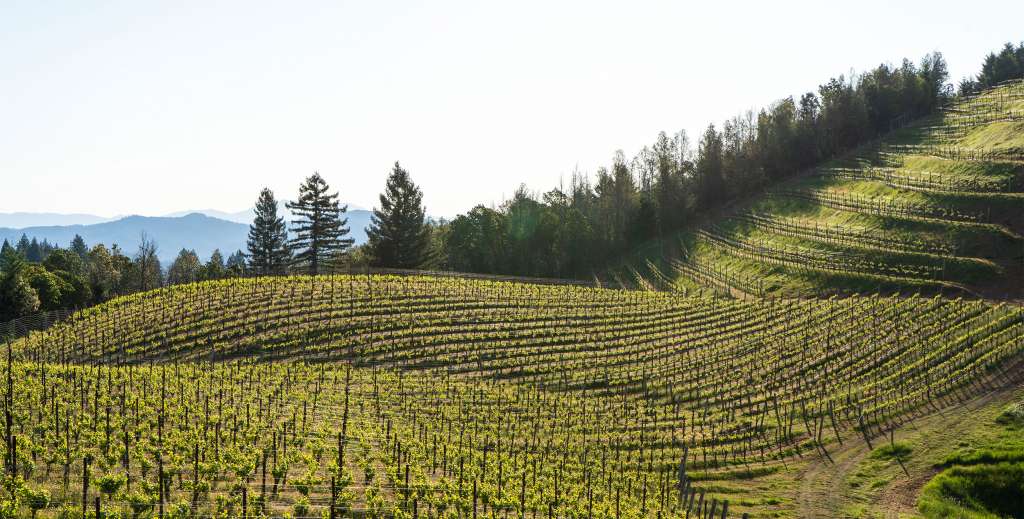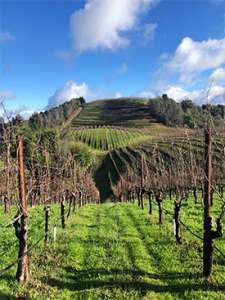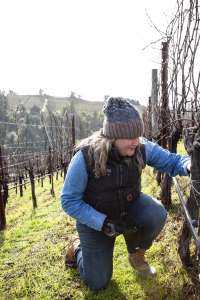
For our seasonal update, we chatted with Flowers winemaker, Chantal Forthun, to learn the importance of the winter season in the vineyards. Our team is actively preparing the vines for spring, and we talked to Chantal to get a sense of their progress.
Flowers Winery (FW) : Chantal, thanks for taking the time to share your insight. Can you tell us what’s happening this winter at Flowers estate vineyards from a vine’s perspective?

Chantal Forthun (CF): Well, we’ve recently had a lot of winter rainfall, which is great for our vineyards. We always want more rain! It hydrates the soils and helps refill the water table. It also keeps our soils cool, and the cooler temperatures help keep vines in dormancy. The dormancy season for the vine begins when the last leaves fall off the vines, so our vine tending activities have been quiet for a little while.
FW: So are the vines effectively sleeping?
CF: On the surface, yes. But the vines are very active underground. This is the time of year when the vines focus their energy on their root systems. Roots will grow, soaking up water and nutrients, which keep the vines strong for the winter months while preparing for new spring growth.
FW: What do you and the vineyard team do when the vines have slowed down?
CF: We are also focused on preparing for the next season. This starts with organic compost in between the vine rows, which will support the cover crops we will plant. We seed specific plants to help act in harmony with our vineyards, carefully selecting those that will invigorate the vineyards and act as nitrogen fixers like peas, legumes and beans. We also have clover everywhere! There are three different kinds of clover between the vine rows across our estate vineyards which will break down into a natural mulch later in the season.
FW: You mentioned “organic”. Where does that fit into your overall farming strategy?
CF: We’ve been effectively organic since 2010. We got officially certified only last year, because it’s a mountain of paperwork! It also doesn’t leave you much flexibility if things go wrong, and we wanted to make sure we could farm our properties organically for the long term.

FW: And where does pruning fit into all of this?
CF: Pruning is one of the most time-consuming and careful processes we undertake all year. It’s tedious and exacting and kind of like external surgery. We first have to identify the healthiest parts of each plant. For our older vines, this means we are looking to preserve the natural energy flow throughout the plant. Precise cuts are made to leave only the strongest wood for the next season’s growth and we remove everything else. It requires experience and focus, and our team is incredible at it.
FW: What’s the most striking difference between winter and the other annual seasons from your perspective?
CW: I think it’s the stark bareness of it all, you can see so much when the leaves are gone. I’m particularly captivated by the contours of the land. The obvious ridgetops and extreme slopes can reveal all of these hidden nuances – a low-lying spot or a natural wind tunnel – that will ultimately impact the way the grapes grow and ripen in that spot later in the season. Every time I walk our properties, I glean more insight into the blocks and sub-blocks. I’m trying to absorb what’s underfoot.
If you have questions for Chantal about the vineyards in the winter season, send us a note to info@flowerswinery.com and we will reach out for the answer!
Our website utilizes cookies and collects anonymous data utilizing Google Analytics to provide you with the best experience.
By continuing to use this site, you verify that you are at least 21 years of age and consent to our data policies.